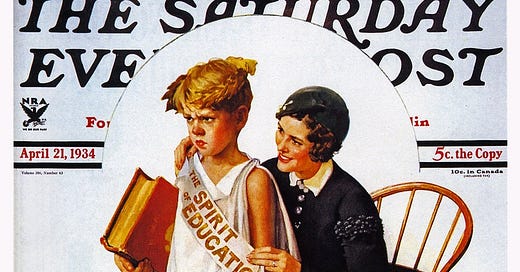From The Atlantic:
The Elite College Students Who Can’t Read Books
Let’s look at this:
In a recent EdWeek Research Center survey of about 300 third-to-eighth-grade educators, only 17 percent said they primarily teach whole texts. An additional 49 percent combine whole texts with anthologies and excerpts. But nearly a quarter of respondents said that books are no longer the center of their curricula. One public-high-school teacher in Illinois told me that she used to structure her classes around books but now focuses on skills, such as how to make good decisions.
And this…
Victoria Kahn, who has taught literature at UC Berkeley since 1997, used to assign 200 pages each week. Now she assigns less than half of that. “I don’t do the whole Iliad. I assign books of The Iliad. I hope that some of them will read the whole thing,” Kahn told me. “It’s not like I can say, ‘Okay, over the next three weeks, I expect you to read The Iliad,’ because they’re not going to do it.”
Those are some good excerpts, but the whole thing is worth a read.
When I taught English at a community college 10 years ago, I was surprised that the students didn’t have to buy any novels, only readers.
I chalked it up to students just looking to check a box, with no interest really in going further in the humanities.
Initially, it’s surprising that professors at elite colleges (Columbia! Berkeley!) are facing this problem with reading and comprehension, but then again, are we surprised?
An aside about teaching at a community college:
I really like community colleges for this reason—they’re very transactional in that way. But they have the best stories. I remember one Ethiopian cab driver talking about conflicts in his country, the guy who recently got his GED but was legit friends with these well-known rappers, the Kurdish student who worked at a local grocery store and well-versed in his home country and culture. I didn’t get that same energy or interest from the kid who went to a local private high school, then went to a private university, and took my summer class for the credit, and then missed half the class because he was attending music festivals all summer. I didn’t pass him.
Who deals with long texts anymore?
Looking back at my own childhood, I was tasked with dealing with difficult reads from a very young age—mostly because I attended a Christian Sunday School…um, uh religiously. And my parents encouraged me to read my Bible and modeled that in our home.
Taking the um, uh religion out of it…the Bible is a big book…that doesn’t always make (immediate) sense…and people spend years upon years revisiting it, trying to understand it!
And there’s been a decline in attending church which ergo means less people dealing with a complicated text like that.
Couple that with a decline in reading in general, and so why again would college kids be different?
Parents don’t read, kids don’t read, and on and on.
Not that every kid who ever goes to Sunday School or who have parents that read books becomes a philosopher or literary fiction reader, but it definitely helped me read Plato and Kant later on in college.
It wasn’t too long ago that having the recent big Tom Wolfe or Jonathan Franzen or Joan Didion book at your house was a societal badge of honor.
At my public suburban high school, I vividly remember reading Othello and Romeo and Juliet and A Tale of Two Cities and even Ivanhoe as a high school sophomore because my teacher LARPed on the weekends.
Was it fun? No. Did I pick up critical reading skills? Yes.
I could see the same happening with excerpts, but then you’re not holding as much in your mind.
It’s a skill to take notes, make mentions in the margins, and then return to those themes later.
Is it sad?
Yes, it’s sad not because they’re not getting the full Inferno experience (the hardest book I had to read on assignment in college) but that fewer and fewer of us know how to think more deeply or to slow down or decipher things that are slightly beyond our immediate comprehension.
Kids these days…as always
I do feel like this is a bit of traditional generational angst.
Every generation thinks the one after it is worse off. And it’s true. I didn’t memorize passages in Latin. I can’t recite Augustine from memory.
There’s a whole classical movement, so maybe the pendulum will swing a bit.
Because it’s true, so many kids can rattle off stats about their favorite YouTubers but can’t read long texts. They have the capacity.
Maybe they aren’t being taught to comprehend at that level.
My daughters read a ton, a lot of graphic novels, but chapter books too.
I don’t know if I’m inspired them to read GREAT BOOKS or anything, but I’m inspired by 2 different friends who recently read Little Women and Dr. Jekyll and Mr Hyde with their kids.
What to remember…
Even if college kids don’t have traditional reading skills like in years past, the world is definitely different. The technology is different.
ChatGPT can give them the summaries, literally. Maybe taking in more information faster is a more worthwhile skill, but I can’t help but to think the ability to think deeply and seek wisdom over knowledge is evaporating.
Old person rant is over.
Keep going-
Josh Spilker





I was lucky when I guest taught at MSU from 2011-2017. Even in CW classes, my students enjoyed reading whole books and in lit classes my minimal assignment for the semester was eight novels even though the associate chair suggested 4-6. I picked books I was enthusiastic about and had already read more than once and that helped.